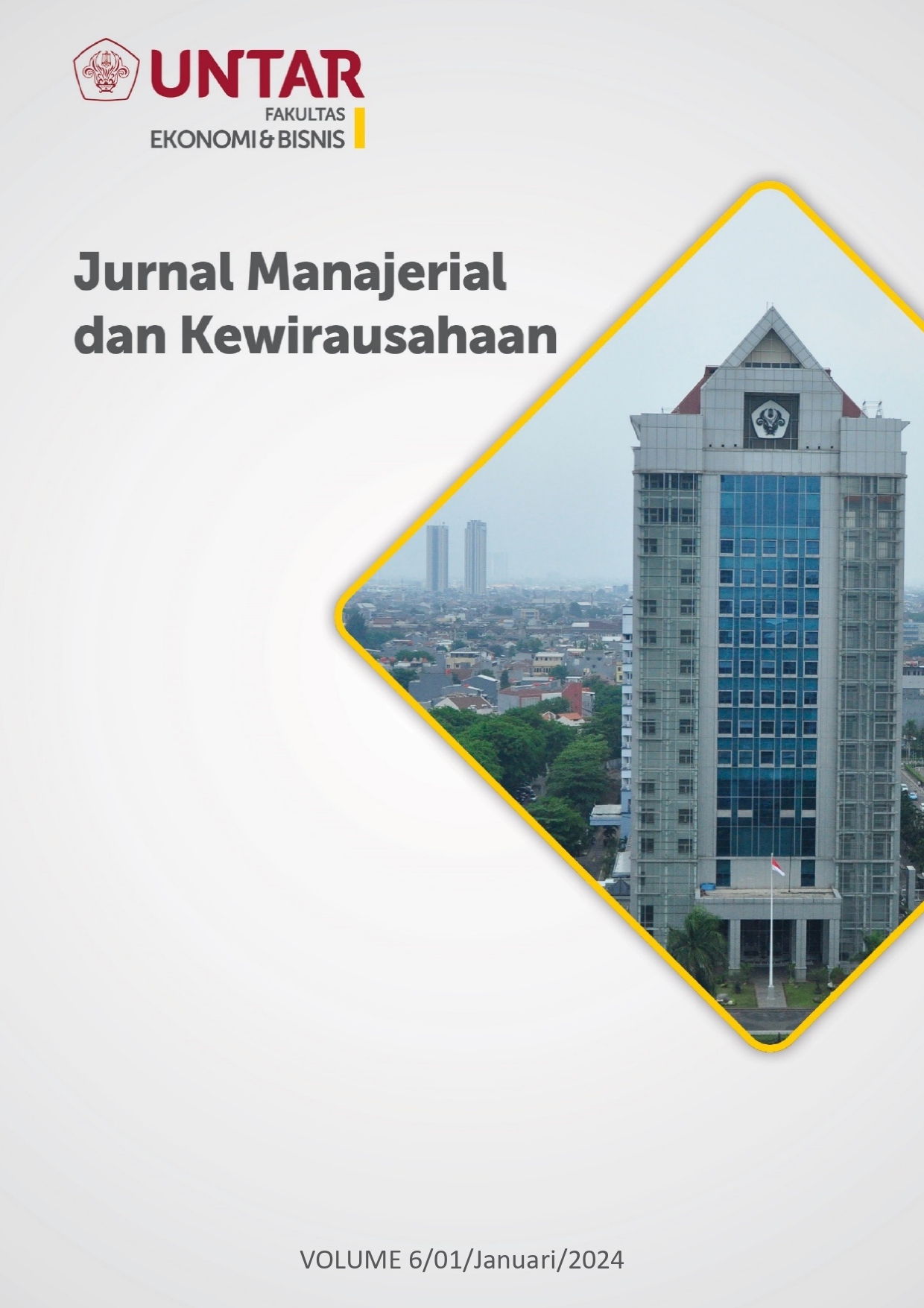Pengaruh E-Trust, E-Customer Satisfaction, dan Perceived Value terhadap Pelanggan Toko Online E-Commerce di DKI Jakarta
Main Article Content
Abstract
This study aims to analyze the influence of customer repurchase intentions at E-commerce online stores in DKI Jakarta by using E-trust, E-customer satisfaction and perceived value as predictors. This study used non-probabilitysampling with a purposive sampling method. The research sample used was 100 online store customer respondents in DKI Jakarta who were generally selected by distributing questionnaires through the online Google form. The resulting data is processed using the PLS-SEM method or Partial Least Square Structural Equation Modeling with SmartPLS version 4.0 software. The results of the study show that E-trust, E-customer satisfaction, and perceived value have a positive and significant influence on customer repurchase intentions at DKI Jakarta E-commerce online stores.
Article Details
Section

This work is licensed under a Creative Commons Attribution-NonCommercial-ShareAlike 4.0 International License.
This work is licensed under a Jurnal Muara Ilmu Ekonomi dan Bisnis Creative Commons Attribution-ShareAlike 4.0 International License.,/p>
References
Alalwan, A. A. (2020). “Mobile food ordering apps: An empirical study of the factors affecting customer e-satisfaction and continued intention to reuse”. International Journal of Information Management, Vol 50, hlm. 28-44.
Ali Abumalloh, R., Ibrahim, O. dan Nilashi, M. (2020), “Loyalty of young female Arabic customers towards recommendation agents: a new model for B2C E-commerce”, Technology in Society, Vol. 61, hlm. 101-253.
Ghozali, Imam (2016). Partial Least Squares Konsep Teknik dan Aplikasi dengan Program Smart PLS. Semarang: Universitas Diponegoro Semarang.
Hult, G.T.M., Sharma, P.N., Morgeson, F.V. dan Zhang, Y. (2019), “Antecedents and consequences of customer satisfaction: do they differ across online and offline purchases?”, Journal of Retailing, Vol. 95, hlm. 10-23.
Javed, M.K. dan Wu, M. (2020), “Effects of online retailer after delivery services on repurchase intention: an empirical analysis of customers’ past experience and future confidence withthe retailer”, Journal of Retailing and Consumer Services, Vol. 54, hlm. 101-942.
Kaya, B., Behravesh, E., Abubakar, A.M., Kaya, O.S. dan Orus, C. (2019), “The moderating roleof website familiarity in the relationships between e-service quality, e-satisfaction and e- loyalty”, Journal of Internet Commerce, Vol. 18, hlm. 369-394.
Khan, M.A., Zubair, S.S. dan Malik, M. (2019), “An assessment of e-service quality, e- satisfaction and e-loyalty: case of online shopping in Pakistan”, South Asian Journal of Business Studies, Vol. 8 No. 3, hlm. 283-302.
Kumar, D.S. dan Sahadev, S. (2019), “E-Loyalty among millennials: personal characteristics and social influences”, Journal of Retailing and Consumer Services, Vol. 48, hlm. 215-223.
Lamlo, S. &Selamat, F. (2020). Brand Salinece, Brand Association, Brand Quality, and Value to Predict Brand Loyalty among The Tourists of Mount Bromo, East Java, Indonesia. Dalam Proceedings of the Ninth International Conference on Entrepreneurship and Business Management (ICEBM 2020), 196-202. https://doi.org/10.2991/aebmr.k.210507.030
Lin, J., Luo, Z., Cheng, X. dan Li, L. (2019), “Understanding the interplay of social commerce affordances and swift guanxi: An empirical study”, Information & Management, Vol. 56 No. 2, hlm. 213-224.
Liu, D. dan Li, M. (2019), “Exploring new factors affecting purchase intention of mobile commerce: trust and social benefit as mediators”, International Journal of Mobile Communications, Vol. 17, hlm. 108-125.
Mahadin, B., Akroush, M.N. dan Bata, H. (2020), “The effects of tourism websites’ attributes on e- satisfaction and e-loyalty: a case of American travellers’ to Jordan”, International Journal of Web Based Communities, Vol. 16, hlm. 4-33.
Malhotra, N.K. (2012). Marketing Research An Applied Orientation. (7th ed). Boston: Pearson.
Miao, M. (2019), “Analysis of the moral mechanism to purchase counterfeit luxury goods: evidence from China”, Asia Pacific Journal of Marketing and Logistics, Vol. 31 No. 3, hlm. 647-669.
Min, Q. dan Shengnan, Han. (2016). “Understanding the effects of trust and risk on individual behavior toward social media platforms: A meta-analysis of the empirical evidence”. Faculty of Management and Economics, Dalian University of Technology, Vol. 56, hlm. 34-44.
Pratama, Y. A. & Tunjungsari, H. K. (2022). Pengaruh Pengalaman Merek pada Loyalitas Merek Produk Merchandise Klub Speak Bola Bali United dengan Mediasi Kepuasan dan Ketidakpastian. Jurnal Muara Ilmu Ekonomi dan Bisnis, 6(1), 224-234. https://doi.org/10.24912/jmieb.v6i1.18436
Sarstedt, M., Hair, J.F., Hult, G.T.M., dan Ringle, C.M. (2017) A Primer on Partial Least Squares Structural Equation Modeling (PLS-SEM). 2nd Edition, Sage Publications Inc., Thousand Oaks, CA.
Sekaran, U. dan Bougie, R. (2013) Research Methods for Business: A Skill-Building Approach. 6th Edition. New York: Wiley.
Sivapalan, A. dan Jebarajakirthy, C. (2017), “An application of retailing service quality practices influencing customer loyalty toward retailers”, Marketing Intelligence & Planning, Vol. 35 No. 7, hlm. 842-857.
Suhartanto, D., Triyuni, N. dan Leo, G. (2018), “Online shopping loyalty: the role of quality, trust, value, and satisfaction”, Advanced Science Letters, Vol. 24, hlm. 735-738.
Syed, T. dan Walker, J.L. (2016), “Affective trust in buyer-seller relationships: a twodimensional scale”, Journal of Business & Industrial Marketing, Vol. 31 No. 2, hlm. 260-273.
Vasic, N., Kilibarda, M. dan Kaurin, T. (2019), “The influence of online shopping determinants on customer satisfaction in the Serbian market”, Journal of Theoretical and Applied Electronic Commerce Research, Vol. 14.
Yew, J.L.K. dan Kamarulzaman, Y. (2020), “Effects of personal factors, perceived benefits and shopping orientation on online shopping behavior in Malaysia”, International Journal of Economics, Management and Accounting, Vol. 28, hlm. 327-360.

